Blade Runner (1982) Review
To celebrate the upcoming release of Blade Runner 2049, we take a look back on Ridley Scott’s original sci-fi classic. Blade Runner 2049 will be hitting theatres the 6th October, directed by the always brilliant Denis Villeneuve and starring Ryan Gosling, Jared Leto and Harrison Ford.
Released : September 9th 1982
Certificate : 15
Director : Ridley Scott
Cast : Harrison Ford, Sean Young, Rutger Hauer, Edward James Olmos, Daryl Hannah, William Sanderson, Joe Turkel
Plot : Set on 2019 earth, robots with near human level of intelligence, called Replicants are used as a work force. When four of the most advanced models escape their work compound a Blade Runner, or Replicant Hunter, is sent to hunt them down.
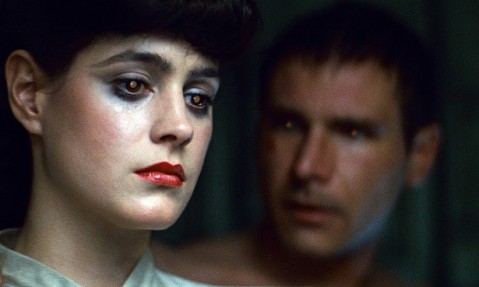 Released just three years after Ridley Scott had cemented himself in the sci-fi genre with Alien in 1979, he returned to the genre for a much more thought provoking tale. While Alien showed how he could masterfully create new worlds with an authentic feel, in Blade Runner he showed how these sci-fi worlds had the capability of deeper meaning and reflection. Not only does the story of Blade Runner bring about deep questions, but literally the architecture of the world Scott create adds to and develops the themes. That’s one of the striking elements of Blade Runner, how the base storyline is a simple as Alien, but the setting, imagery, dialogue and sound all take this plot and help develop it into something more profound.
Released just three years after Ridley Scott had cemented himself in the sci-fi genre with Alien in 1979, he returned to the genre for a much more thought provoking tale. While Alien showed how he could masterfully create new worlds with an authentic feel, in Blade Runner he showed how these sci-fi worlds had the capability of deeper meaning and reflection. Not only does the story of Blade Runner bring about deep questions, but literally the architecture of the world Scott create adds to and develops the themes. That’s one of the striking elements of Blade Runner, how the base storyline is a simple as Alien, but the setting, imagery, dialogue and sound all take this plot and help develop it into something more profound.
To refer to the simply nature of the plot, everything is laid out at the start in text form. Man creates intelligent life as a workforce, some rebelled, humans crush the rebels and ban these life forms from earth. Here the film opens up so many themes such as identity, morality, slavery, colonialism and social structure. Scott then creates a world which reflects these themes. It has been widely discussed how the social structural themes of the Replicants slavery in mirrored by the architecture of the city. The buildings that house the wealthy creators of the Replicants clearly look like a temples fit for a king. The inhabitants of this upper class society are white males and the interiors are all polished and neat, while the city life below it is multi-cultural, gritty and chaotic. A clear commentary on racial and social structure issues. The film is full of imagery such as this. A return to this series is so exciting as it promises a re-emergence of profound imagery that has been missing in the sci-fi genre recently. Denis Villeneuve has brilliantly attempted to bring back this importance of imagery to the genre with Arrival.
Which leads onto other aspects of Blade Runner. In Arrival while the imagery is sprawling and profound, Villeneuve always focuses on the human emotive aspects of the story. For Arrival that is the struggle of motherhood. Blade Runner also never fails to remain focused on the characters and their struggle, despite all of its morality and creationism themes. Blade Runner is a film that uses its simple narrative not only for deeper themes but aptly fleshes out the characters involved. Each main player in the film struggles with their identity, for example we see Harrison Ford’s Deckard identity as a Blade Runner fall apart as he questions the morality of his job. Scott is able to deal with the grand themes and the small personal struggles of the character seamlessly and in an even-handed way. It is the amalgamation of these large ideas and small character struggle which make Blade Runner amazing, and then there is the music.
The score of the film was created by legendary film composer Vangelis, whose work is too great to list. Probably most famous for his Oscar winning score for Chariots of Fire. The score for Blade Runner was created entirely in post-production as Vangelis created the sounds via initial viewing of each image and scene of the film. This layered a second vision onto the film, after Scott had finished, Vangelis applied his own interpretation via the music. The results is stunning and the music is an integral part of the experience. Throughout the film a distant dreamlike sound is created, in which distant echoes and drawn out notes are repeated. This distant the sounds create can be interpreted in many ways, firstly as a dream, or perhaps connoting how despite the futuristic setting many of the themes and issues are familiar to us. As well as this it acts to also reflect the characters emotions with great humanity. Just as Scott did, Vangelis was able to deal with the big themes and the characters equally.
Blade Runner works on so many levels. Visually stunning, rich with character drama and brewing with deeper themes and ideas. It’ll be a joy to return to this world next month, thirty five years after the original was released. The ability to juggle the big themes as well as the characters is something that Denis Villeneuve has proven he can do time and again, and his recent work in Arrival shows he’s more than capable in the sci-fi genre. Other reasons to be excited that the sequel will be treated with respect is the addition of Ryan Gosling and Jared Leto, as well as cinematographer legend Roger Deakins (The Shawshank Redemption, No Country for Old Men), and some of Villeneuve past co-workers such as editor Joe Walker (12 Years a Slave, Arrival) and composer Jóhann Jóhannsson (Sicario, The Theory of Everything).
Verdict : A film worthy of the title of sci-fi classic. A film which visual beauty is matched by its richness of story and imagery.
Verdict : 5/5
Quote : “All those moments will be lost, like tears, in rain.”
- in 2016, 2D, Cinema, films, Genre: sci-fi, Rating: 4/5, Reviewed by: SO, Reviews
- 1 Comment
Arrival Review
Starship Bloopers
Released : November 10th 2016
Certificate : 12
Director : Denis Villeneuve
Cast : Amy Adams, Jeremy Renner, Forest Whitaker, Michael Stuhlbarg
Plot : After 12 UFO’s land across the globe, the US army recruits linguist Louise Banks (Adams) and mathematician Ian Donnelly (Renner) to help communicate with the aliens.
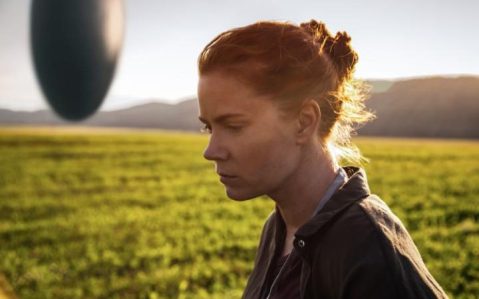
From the screenwriter of the 5th Final Destination film and The Nightmare on Elm Street, ironically comes one of the smartest films of the year. Of course the aspect of the crew that got all cinema goers excited was that of the director. A director renowned for his dark thrillers which drip with brilliant cinematography and calculating presentation. Also ironically, the year the most iconic alien film has a sequel, this film takes the genre in a whole new direction and tone. As we enter the end of the year, this continues the early oscar buzz excitement as the good reviews poor in for the film.
From the screenwriter of the 5th Final Destination film and The Nightmare on Elm Street, ironically comes one of the smartest films of the year. Of course the aspect of the crew that got all cinema goers excited was that of the director. A director renowned for his dark thrillers which drip with brilliant cinematography and calculating presentation. Also ironically, there year the most iconic alien film has a sequel, this film takes the genre in a whole new direction and tone. As we enter the end of the year, this continues the early Oscar buzz excitement as the good reviews poor in for the film.
The story of the film is a brilliant one, and a very new approach to the alien genre, arcing back to Close Encounters territory. Granted only so much credit can be given to the film maker for this aspect, as it is an attempted screenplay. What was really needed to make such a story work was the hand of Villeneuve. A director who was willing to take the time with the story, its complex themes and to avoid as many conventions and clichés in order to realize such a unique approach. Fortunately, these are all features that Villeneuve has displayed throughout his whole work and performs brilliantly here. One feature that Villeneuve is so good at, is building and maintaining an atmosphere that suits the film perfectly throughout his film. The overriding themes that he conveys through the shots in this are that of tremendous spectral, and innocence. All the shot surrounding the aliens are beautiful enough and well thought out enough to make up (mostly) for the lack of ‘action’ that occurs on screen.
Aspects of the film that felt slightly disappointing was the execution of some narrative point. The film centre’s around a single question for the aliens, and thanks to Villeneuve shot that instil and sense of awe, there is the anticipation of a great poignant reveal to this question. The reveal and execution felt slightly rushed, which was surprising, since all other aspects of the film were given such good time to mature. The use of an exposition dump was slightly off. As well as this, the answer wasn’t quiet as smart as the rest of the film annoyingly, such a sense of awe that was built up played off for a rather simple concept. But these issues will be mostly overlooked for many critics and audience members as it is wrapped up in such a brilliant complex and unpredictable plot overall, that a few issues with the climatic acts won’t be much of an issue. The one narrative flaw that some audience might not forgive is that of the pacing, but for most the intellectual drama will be a good enough counterpart for the bullets.
The acting of course as always from Adams is of a very high quality, and she dealt very well under Villeneuve style of heavy reliance of close up of characters. Although it is almost accepted these days, it is worth remembering the skill require to act to nothing, as this film went through probable its share of green screen. One general consensus from many reviews is grips with the character of Jeremy Renner, and a useless of this. While this character doesn’t develop the plot particular, it brings a great level of humanity delivered very well by Renner which was need in the balancing of the tone. The tone of which is unlike any other film that has dealt with aliens, in a film that is overall one of the most unique of the year. While it contains a few flaws, and not quite as much white knuckle excitement as Villeneuve other films, Arrival and very well executed new addition to a genre and will be remembered.
Verdict : Not quite as fulfilling as his other works, due to some small issues. But Villeneuve has brought another very well acted, stunning well shot, thought-provoking film to our screens.
Verdict : 4/5
Quote : “Now that’s a proper introduction.”
Chappie DVD Review
RoboCop
Released : March 6th 2015
Certificate : 15
Director : Neill Blomkamp
Cast : Sharlto Copley, Hugh Jackman, Dev Patel, Yolandi Visser, Watkin Tudor Jones, Sigourney Weaver
Plot : South Africa has become the leading county for crime fighting, as the chaotic gang crime and high murder rates have been tamed by a division of robotic police force. But conflict ensues when the creator of the robots (Dev Patel) gifts one robot with a coded consciousness.
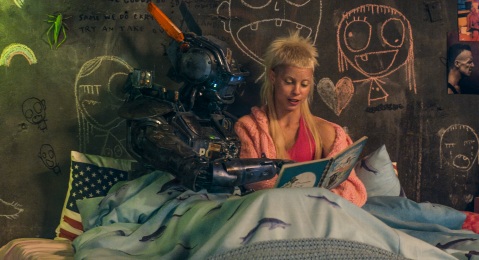
Neill Blomkamp returns for his third South African based violent sci-fi flick, and this time its more South African than very before, as joining the South African talent Sharlto Copley (present in all three Blomkamp outings) is now South African rap duo Die Antwoord, staring and generating the soundtrack of the film (along with the help of Hans Zimmer) . For this feature, since Blomkamp has dealt with aliens, and spaceships, he now rests his sights on robots and artificial intelligence, with a script he has written (as he did with Elysium and District 9). With his third film the promises of talnet that were earned with Best Picture nominionee District 9 are still present, despite the modest critical reception of Elysium which was deemed to be lacking in the creativity and heart that its predecessor had. Perhaps the complex plot point that come with aritifical intelligence be ale to bring back some level of heart, to balance out Bloomkamp reliance for big cgi effects and extensiveness violent action sequences to allow for a film of better praise by critics who are looking for more than the average sci-fi shoot em up film type, despite the gripping and skillfully nature behind many of these films.
To address Blomkamps writing for this feature, which was completed with the help of co-writer Terri Tatchell, who also co-wrote District 9, there is undeniable aspects for dispute. This isn’t held within the largely 2d supporting characters (tipified by the villains of Blomkapms films) but more the set of a generic formula of the film. Despite the creative settings that both Elyusim and Chappie presented, there is the obvious generic rivalry in the film, you can see from the opening who is pitted against who and that the film for all of its development will boil down to and extravagant (all be it entertaining) closing action sequence. Good vs evil which is set up and set in a predictable direction to pay off for the big scale crash and bash (not that this isn’t well done, but makes for an uninventive story, rapped up in inventive premise). Secondly to this is and ending that may have outreached the bounds of imagination for many audience members, despite it being for the reason to make a profound ending to the film (bringing in some of that heart) it does so with a stretch too far, even for the world of sci-fi.
But for the positive attributes of Blomkamps, it is a joy to see his trade marks return to the screen, with noticeable trade marks making as repetitive (in a good stylistic way) as Zac Synder, but for sci-fi. Blomkamps iconography is as always, brilliant and beautiful, helped by the addition of Trent Opaloch, cinematographer for Blomkamps previous films (as well as the equally visually stunning Captain America: Winter Solider). There work together helps to create worlds and characters that are truly a visual feast that are underrated in this respect, as are the action sequences they produce which due to their bloody nature with Blomkamp get slightly smeared. This is what makes Blomkamp much more alike Zac Synder than Michael Bay, for his signature trade mark visual nature to his films. With this in mind as to the artful choreography of his action scenes, Chappie is lacking in them in comparison to Blomkamps previous work, making for a film with a slight lack of pace in some scenes, but doesn’t lose their visual appeal with a strong opening and closing display of bullets flying. Although it could easily be argued that like Synder, there is sometimes a tendency to rely on slow motion action too frequently.
As for the acting talent on offer, we have a voice performance by Sharlto Copley, making for an odd but effective robot with a South Africa accent, a very brutish and 2d Hugh Jackman as the badie veteran, and the interesting addition of a rap duo trying their chops at acting. Copley is able to create more of an interesting character than previously in Elysium, as he was burdened with the 2d villain role (which he performed with impressive conviction, but ultimately wasted on the character), how much of the voice was genuine or altered in post production is unknown but the end effect is impressive. To a large degree Yolandi Visser and Watkin Tudor Jones suit their roles like a glove, due to a degree them playing watered down versions of their on stage music personas, odd ball and gangster. Helping to create a ‘family’ dynamic with Chappie that is convincing and brings a level of emotion and conviction which is surprising for rap artists, and the addition of their songs in the sound track suit every aspect of the film pitch perfectly. The addition of Dev Partel is good type casting as is Hugh Jackmen, to embody the nerdy moral aware programmer and the hard headed ruthless solider, hence the actors are sutied to their roles to make performances with good conviction and help to anchor the beautiful and believable world created by Blomkamp and Opaloch.
Unfortunately it might have to be said that Chappie is the worst of Blomkamps sci-fi trilogy, but this doesn’t change it from being a Blomkamp film, and that means there is an inherent high quality, it just dropped a bit for this installment. The main falling point of this film is the potential that comes with the artificial intelligence genre and the interesting concepts that this holds, and why the film quickly and early finds direction, the final third loses it self in a generic good versus evil followed by an slightly outlandish stab at a profound ending. But along the way the audience will be rewarded with laughs, thrills and awe of Blomkamps eye for making the cgi effects artistic rather than gratuitous, this with his continuing imagination maintains him as one of the leading lights of the sci-fi genre. He will continually suffer from his first outing be so strong and everything being compared to this, but Chappie is by no means anything close to a bomb, just not as unique as the premise and director/writer could have been. A thrilling outing that may not be as memorable, but is a fast burning rush, that might stumble at the final hurdle, but this doesn’t smear the overall experience.
Verdict : No sci-fi classic, but its a tasteful rehash of old genre concepts and Blomkamps finger prints are all over it, making it an cut above the rest of yearly sci-fi entries.
Verdict : 3/5
Quote : “Why did you build me to die maker?”
Mini review: The Hunger Games: Mockingjay Part 2
Year: 2015
Certificate: 12A
Director: Francis Lawrence
Screenwriters: Peter Craig, Danny Strong, Suzanne Collins
Cast: Jennifer Lawrence, Josh Hutcherson, Liam Hemsworth, Donald Sutherland, Mahershala Ali, Sam Clafin
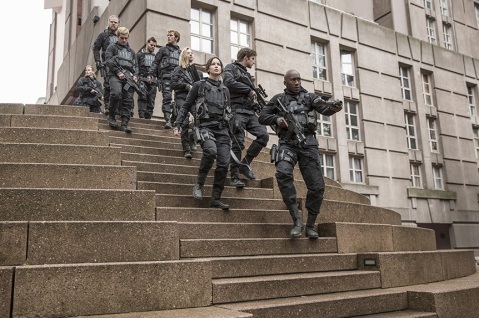
After surviving the Hunger Games and the Quarter Quell and becoming the figurehead of a nascent rebellion in the districts, Katniss Everdeen (Jennifer Lawrence) and the other rebels must face one final push into the Capitol if they are to overthrow the despotic President Snow and bring peace to Panem.
Director Francis Lawrence valiantly wrestles a well-paced action thriller from what is arguably one of the weaker books in the series, ably wrangling improbable setpieces as Katniss and co. make their way through the booby-trapped streets of the Capitol. The emotional beats work well, with Jennifer Lawrence doing most of the heavy lifting to inject credible human drama into the fantasy scenarios. However, it all feels a little paint-by-numbers at this point, and the demands of the plot leave little time for the sharp political allegory that was an attractive element in the second and third instalment, although the discussions around precisely how much violence is a justifiable price for peace are certainly topical. The impressive supporting cast (including a gloriously scene-stealing and all too brief reprisal from a shaven-headed Jena Malone as former tribute Johanna) get their moments to shine, and Josh Hutcherson gives his best performance of the series charting Peeta’s erratic recovery from torture and indoctrination at the hands of Snow.
While not the best of the franchise, Mockingjay part 2 rounds off the story well and provides an entertaining few hours of action with just enough political intrigue to bring some depth.
Verdict: 3/5
Image credit: lionsgate.com
Review: Advantageous
Year: 2015
Certificate: 12
Director: Jennifer Phang
Screenwriters: Jacqueline Kim, Jennifer Phang
Cast: Jacqueline Kim, Samantha Kim, James Urbaniak, Jennifer Ehle, Freya Adams
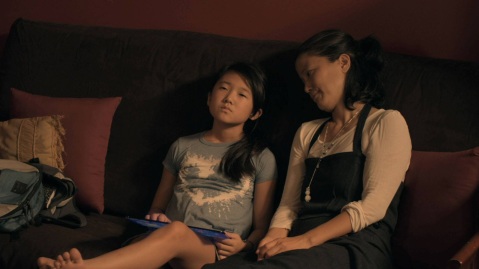 In a near-future North American metropolis, single mother Gwen Koh (Jacqueline Kim) is the face of the Centre for Advanced Health and Living, a company offering clients the ability to gain a more advantageous look by transferring their consciousness into a new body. When the company replaces her with a younger spokesperson, Gwen comes face-to-face with the discriminatory employment priorities of her society. Faced with escalating financial difficulty, Gwen must decide whether to take a risky but fiscally rewarding decision in order to secure her daughter Jules (Samantha Kim) a place at a prestigious prep school.
In a near-future North American metropolis, single mother Gwen Koh (Jacqueline Kim) is the face of the Centre for Advanced Health and Living, a company offering clients the ability to gain a more advantageous look by transferring their consciousness into a new body. When the company replaces her with a younger spokesperson, Gwen comes face-to-face with the discriminatory employment priorities of her society. Faced with escalating financial difficulty, Gwen must decide whether to take a risky but fiscally rewarding decision in order to secure her daughter Jules (Samantha Kim) a place at a prestigious prep school.
A chilling picture of an all-too-imaginable future, Phang’s ambitious but understated film is both a subtle exploration of delicate family dynamics and a scathing commentary on society, race and gender. Initial shots of Jules running and dancing, carefree, along the pavement with her friends provide a stark contrast to her hunched and tense posture as she tries to study while the crying of the woman in the apartment below drifts up through the floor. The city itself first appears idyllic- chrome and glass fronted, with dynamic sculptures, clean streets and a leafy park- but the spectre of unrest and inequality soon creeps in as Jules and her friends observe an explosion in a distant building (‘not again’ sighs Ginger), and Gwen finds a woman sleeping rough in the hedgerow outside her apartment block.
While the near-future setting touches on familiar science fiction mainstays (the rich getting richer, the poor getting poorer, and flying cars), the focus on how societal expectations of race and gender may change feels both well considered and realistic. After losing her job, Gwen finds it almost impossible to get re-employed. In a telling conversation with her ex-employer is told that making women redundant is “safer… than having desperate men on the streets.” Suddenly, the fact that it is women who Jules can hear crying in the adjacent apartments, and who Gwen sees sleeping on benches and in hedgerows, begins to make sense. Similarly, at first glance the world seems post-racial. Gwen, a child of Asian immigrant parents, has risen to a high and visible position at her company, and Jules’ friendship group is racially diverse. However, several interactions make it clear that race is still a factor in determining societal order. Gwen’s (white) bosses tell her they’re looking to replace her with someone whose look is ‘more universal,’ and the catalogue of inspirational transfer bodies available from the Centre for Advanced Health and Living are racially ambiguous but unfailingly light-skinned. Indeed, the advertisement that Gwen stars in for the company tacitly states that transference would be an attractive option for those who feel ‘held back’ by their race. As palpable as these themes are though, they never feel over-emphasized, and Gwen’s central motivations during the film: to find a good job, to secure her daughter’s future, and to re-establish broken family ties, transcend her situation as a member of more than one marginalised group even as they are influenced by it.
Director and co-writer Jennifer Phang brings a dreamy atmosphere to the proceedings, with the sinewy morphing corporate art of the buildings, vastness of the city and hologram phone calls creating a believable near-future. This, coupled with the film’s refusal to jump in with immediate exposition invites comparison to the work of Shane Carruth, particularly Upstream Colour, although Advantageous is less wilfully obtuse. The Kafkesque nature of Gwen’s odyssey and cast of mysterious supporting characters (the group of women Gwen dines with in an opulent setting have more than a little of Macbeth’s wyrd sisters about them) create a slow, gnawing tension which is as enticing as it is disturbing, and the dramatic twists scattered throughout achieve the mean feat of eliciting thrills without the need for big-budget bombast.
Verdict: 5/5
Bonus: Phang’s original short film upon which the movie is based can be viewed here. The full film is available everywhere on Netflix and on demand.
Image credit: facebook.com/Advantageous
Review: The Signal
Released: 27th March
Certificate: 15
Director: William Eubank
Screenwriter: Carlyle Eubank, William Eubank, David Frigerio
Cast: Brenton Thwaites, Olivia Cooke, Beau Knapp, Lawrence Fishburne
So far, 2015 appears to be the year for left-field sci-fi, with releases such as Ex Machina and Predestination bringing fresh and interesting takes on well-worn genre tropes. Unfortunately The Signal, despite its indie trappings, has neither the impact nor the excitement of the aforementioned films. Nic (Brenton Thwaites) is an MIT student and hobbyist hacker struggling with a recent diagnosis of an ALS-like (but unnamed) condition. While driving his girlfriend Haley (Olivia Cooke) across the country to Caltech in the company of their best friend Jonah (Beau Knapp), they take a detour in an attempt to ambush mysterious hacker Nomad, with whom they have a score to settle. One uncanny encounter later, Nic wakes up in a secret government facility where he finds himself being debriefed after an extra-terrestrial encounter, of which he has no memory, by the hazmat-suited Dr Damon (Laurence Fishburne).
While the individual sequences are undeniably atmospheric and, when required, creepy, The Signal is a case of style over substance. In the initial setup the characters are too roughly sketched, and not particularly likeable, lowering the stakes of their sequestration. More unforgivably, Haley is relegated to the sexist clichés of being the nagging girlfriend before their encounter with Nomad and the comatose motivation for the hero to fight back after it, and is clumsily sidelined in the denouement to make way for the actions of the principal male characters. Although there are some interesting concepts at play such as safety at the expense of personal agency, how humans react in the face of the inexplicable, and just who needs to be protected from whom, the execution does not produce a compelling synthesis of these ideas, instead devoting its energy to mood-building imagery for which there is no payoff.
Verdict: 2/5
Image credit: focusfeatures.com
Review: Predestination
Released: 20th February (cinema, Blu-Ray and on demand)
Certificate: 15
Directors: Michael and Peter Spierig
Screenwriters: Michael and Peter Spierig
Cast: Ethan Hawke, Sarah Snook, Noah Taylor
We’ve all heard the one about the guy walking into the bar. However, when that bar is tended by a time-travelling secret agent working incognito to foil a notorious bomber, and the guy walking in has an incredible and tragic story to tell, things can begin to take off in some very unexpected directions. The agent in question, played by Ethan Hawke, is undercover in 1970s New York when into his bar walks John (Sarah Snook), a writer with a chequered past and a thirst for revenge. The two strike up a conversation, but find that their fates are more intertwined than they might have first expected.
Opting to pick a tricky time-twisting premise (based on Robert A Heinlein’s story ‘All You Zombies’) and run with it, Predestination is high-concept science fiction at its hyperbolic best. The cast absolutely sell the somewhat absurd story, which is the main reason that the film works as well as it does. Hawke’s mysterious time traveller is clearly conflicted, disobeying his own rules regarding time jump frequency, and while he seems honest enough Hawke puts something behind his eyes which never quite allows the audience to trust his motives. But Predestination is really brought to life by Sarah Snook’s portrayal of the hangdog John, before and after his transition to male. The bitter and purposeless John of 1978 is a sharp contrast to his younger self, who is capable, cocky and ambitious, and whose life is ruined by a romantic indiscretion.
Transgender and intersex characters (both identities are relevant to John) are still a rarity in cinema, and so each occurrence bears an unfair burden of representation. In this respect, Predestination is a partial success. The depiction of the physical aspect of John’s transition, while frank, does not feel prurient or exploitative, and his gender identity is not the most interesting thing about his character. However, there is an amount of biological determinism at play which, while completely at home in a story which is all about determinism, perhaps should have been examined and deconstructed further.
The light touch with which the film treats its heftier themes saves it from getting bogged down in its own mythology, however at times this focus on pace over philosophising can render things a little shallow. This is reflected in the direction and cinematography, which provides some arresting images but is ultimately more functional than truly artistic. Similarly, although the tricky time travel narrative is well synthesized, the visual execution is sometimes a little clumsy, flagging up the twists so that their arrival has perhaps less impact than might have been possible otherwise.
Choosing to eschew philosophical navel-gazing in favour of a compact and fast-paced plot, Predestination occasionally feels a little slight. However, the unique premise and fantastic performances by the principal cast bring a real charm to this entertaining piece which rewards repeat viewing.
Verdict: 4/5
Image credit: facebook.com/PredestinationMovie
Review: Ex Machina
Released: 21st January
Certificate: 15
Director: Alex Garland
Screenwriter: Alex Garland
Cast: Alicia Vikander, Domhnall Gleeson, Oscar Isaac, Sonoya Mizuno
Caleb (Gleeson), a coder at multinational search engine Bluebook (a Google by any other name) wins an employee lottery which sends him to the house of reclusive CEO Nathan (Isaac). His prize? A week of one-on-one audiences with the newly built Artificial Intelligence Ava (Vikander), in order to determine whether she passes the Turing Test.
With this simple premise, Ex Machina offers something which (to paraphrase Mark Kermode) is a feature of all the best sci-fi: an interesting speculative idea which is neatly and thoroughly explored. Indeed, one of the most interesting elements of the film is that its central question – what constitutes personhood- is not only explored but elegantly deconstructed. Through the lens of Caleb’s interactions with Ava, Nathan and the mysterious Kyoko (Sonoya Mizuno), the audience is forced to take a good long look at their own assumptions about how intelligence, humanity and consciousness are defined. Progress, power, identity and autonomy are all unflinchingly examined in an elegant, thrilling and at times unsettling 108 minutes.
The setting, dialogue and performances complement the themes perfectly. Garland’s tight directorial style enhances the claustrophobic feel of Nathan’s futuristic domain, and the close and unfussy camerawork invites the audience to scrutinise each of the key players as we try to get to grips with their shifting motivations. Garland revels in perpetually overturning paradigms, and the casts’ performances play perfectly into this. Gleeson proves once again his skill at adding depth and uncomfortably identifiable flaws to ‘everyman’ characters, while Isaac’s Nathan is a nuanced portrayal of the internal disharmony caused by the relentless pursuit of progress and power in an isolated situation. Vikander ably grapples with a toughest role, creating a presence which is both newborn (the birdlike twitches of her head pair perfectly with the digitally inserted whirring of internal machinery) and complex, beguiling and uncanny by turns. The house, too, is a co-conspirator, with its subterranean bunker rooms and intermittent lockdowns. In an intriguing touch, the set up of Ava’s rooms mean that during Caleb’s visits he sits surrounded on three sides by glass, while Ava roams around him, re-enforcing the idea that Caleb is in some ways as much a specimen as she.
At times a tough watch, and more than earning its 15 certificate in the third act, Ex Machina is determined to dig its fingernails under the surface of what qualifies an entity for personhood. The potentially problematic format of having two male observers surveilling an apparently female AI is directly addressed in a thorough manner, however there are some sequences that don’t quite manage to pull of the difficult trick of commenting on a societal problem without perpetuating it (forgive the obtuse explanation, I’m attempting to avoid spoilers wherever possible). However, the rigour and self-awareness with which the ideas proposed are examined in the second and third acts, and the bold and uncompromising ending add up to extremely satisfying dramatic fare.
Verdict: 5/5
Image credit: exmachinamovie.co.uk
Review: The Hunger Games: Mockingjay Part 1
Released: 20th November
Certificate: 12A
Director: Francis Lawrence
Screenwriters: Peter Craig, Danny Strong, Suzanne Collins
Cast: Jennifer Lawrence, Josh Hutcherson, Woody Harrelson, Philip Seymour Hoffman, Julianne Moore, Natalie Dormer, Elizabeth Banks
Another year passes, and the most successful series of young adult novel adaptations since Twilight returns for its third cinematic instalment. Encompassing the first half of the book of the same name, Mockingjay part 1 picks up where Catching Fire left off: at the inception of a revolution led by District 13 against the despotic Capitol.
Ostensibly, leaving the tried-and-tested formula of the titular arena behind would seem to be a risk; however the transition from gladiatorial combat to political intrigue is executed seamlessly. The filmmakers continue to flesh out the world of Panem beyond the eponymous games, with the districts play a larger part than ever before. For the first time we meet Capitol exiles, and see their contrasting reactions to the District 13 way of life- from Effie Trinket’s arc from self-pity to self-resolution (Elizabeth Banks proving that it is not just the wigs that make the woman), to the hard-edged Cressida (Natalie Dormer) and her film crew. The expanding cast and action setpieces at times mean perhaps less time is spent on character development than would be ideal. Lawrence brings such subtlety to Katniss, and it would have been interesting to have given her more time to exhibit Katniss’ vulnerability after the trauma of the games, which is explored in more depth in the novel from which the film is adapted.
This is not to say that characterisation falls completely by the wayside. Effie, District 4 tribute Finnick (Sam Clafrin) and District 13 leader Alma Coin (Julianne Moore) all have interesting arcs, and Katniss herself goes on an impressive journey. Katniss is a mesmerising protagonist, her anti-heroism manifesting not as showy callousness (as with Marvel’s Tony Stark and his ilk), but as a stony pragmatism: she knows what is important to her and will move to protect it, even if this directly contravenes what appears to be the ‘greater good.’ And, while this worked in the arena, Katniss is discovering that the fact of her being instrumental to a bigger movement will require her to change. However, she resists being commodified even as she realises that it is probably necessary.
This problem of trying to create a hero out of someone who is fundamentally un-heroic is a well-worn path that nevertheless is made fresh by Lawrence and co., and feeds nicely into the film’s overarching discussion of how media can be as powerful a weapon in conflict as armaments. The irony of needing Capitol-trained personalities (Seymour Hoffman’s excellent Heavensbee and Dormer’s Cressida) to do the propaganda work of the revolution is cunningly delivered. Cressida’s eyes, while free of heavy Capitol makeup, gleam with triumph as she spots a Katniss moment of genuine identifiability which can be exploited for the cause.
Despite being a ‘part 1’ adaptation, the film feels complete within itself and stops at a logical place within the narrative while still leaving a cliffhanger ending which cues up 2015’s part 2. While it doesn’t quite equal Catching Fire for pace and verve, it encompasses the increasing thematic complexities of the novel while delivering something truly cinematic and action-packed.
Verdict: 4/5
Image credit: reelcinemas.co.uk
Review: Interstellar
Released: 7th November
Certificate: 12A
Director: Christopher Nolan
Screenwriters: Jonathan Nolan, Christopher Nolan
Cast: Matthew McConaughey, Mackenzie Foy, Anne Hathaway, David Gyasi, Wes Bentley, Michael Caine
Every now and again a film comes appears with such startling ambition that it is impossible not to take notice. A high-concept space opera made for the masses, Interstellar pulls off that most Nolanesque of tricks: achieving spectacle, intimacy and mind-bending mystery without being either condescending or deliberately obtuse. Set in a near-future America reeling from a famine-driven partial societal collapse, the film places the relationship between engineer-turned-farmer Cooper (Matthew McConaughey) and his daughter Murphy (Mackenzie Foy), firmly in the foreground. When Cooper is recruited for an intergalactic mission to seek out other inhabitable planets, he must face the possibility he will not return.
Cooper and Murphy’s relationship anchors the emotional stakes of Cooper’s mission to find a better home for humanity, without feeling overtly manipulative. This is mostly due to Foy’s astonishing performance- Murphy is capable, inquisitive and steely, so her palpable vulnerability when her father’s departure becomes inevitable is utterly devastating. Her refusal to capitulate and talk to him even as he drives away to a potentially terminal journey adds a hard edge to the proceedings, and a tinge of regret accompanies Coop’s every action afterwards, beautifully realised by McConaughey. Anne Hathaway delivers a layered and engaging performance as spacefaring scientist Dr Brand, who has an interesting and sometimes fraught dynamic with Cooper which stays mercifully well away from romance.
In the film’s second act the action really kicks off, with well thought out special effects illustrating hitherto unseen space and timescapes in a way that feels disconcertingly real: you could almost believe that Nolan showed his intergalactic holiday snaps to the VFX team for inspiration (although in truth the film’s scientific advisor, Kip Thorne, probably deserves the credit). This verisimilitude packs a punch: once you believe the characters are really there, the true horror of the void is front and centre. At one point Cooper says “we are not prepared for this,” and as an audience member you can’t help but feel the same; it is overwhelming and exhilarating in equal measures, and the innate hostility of exploration which has been present throughout human history finds a space-age echo here.
There are a few bum notes, however. The script at times veers towards the highfalutin, particularly when it comes to meditations on love. As is so often the case, showing is better than telling, and although the film does plenty of showing, the occasional clunky bit of dialogue on love-as-a-universal-force slips in. The robot assistants, although smartly written, struggle to look congruent despite being well rendered. However, in a project of this scope and audacity it is unsurprising that some elements don’t quite work, but those that do more than make up for it. Overall Interstellar is an occasionally overwhelming but utterly engaging experience, demonstrating the power of cinema to provoke horror, exhilaration and awe.
Verdict: 5/5
Image source: interstellar.hamiltonwatch.com
Recent Posts
Archives
- September 2017
- February 2017
- January 2017
- November 2016
- October 2016
- September 2016
- June 2016
- April 2016
- March 2016
- February 2016
- January 2016
- December 2015
- November 2015
- October 2015
- September 2015
- August 2015
- July 2015
- June 2015
- May 2015
- April 2015
- March 2015
- February 2015
- January 2015
- December 2014
- November 2014
- October 2014
- September 2014
- August 2014
- July 2014
- June 2014
- May 2014
- April 2014
- March 2014
- February 2014
- January 2014
- December 2013
- November 2013
- October 2013
Categories
- 1961
- 1982
- 1985
- 2010
- 2011
- 2012
- 2013
- 2014
- 2015
- 2016
- 2017
- 2D
- 3D
- Cinema
- Classic Reviews
- Collections
- DVD
- films
- Genre: action
- Genre: animation
- Genre: biopic
- Genre: comedy
- Genre: drama
- Genre: fantasy
- Genre: horror
- Genre: LGBTQ
- Genre: musical
- Genre: period drama
- Genre: sci-fi
- Genre: superheroes
- Genre: thriller
- Genre: western
- Netflix
- Preview Article
- Rating: 1/5
- Rating: 2/5
- Rating: 3/5
- Rating: 4/5
- Rating: 5/5
- Reviewed by: AES
- Reviewed by: SO
- Reviews
- Top 5 List
- Uncategorized
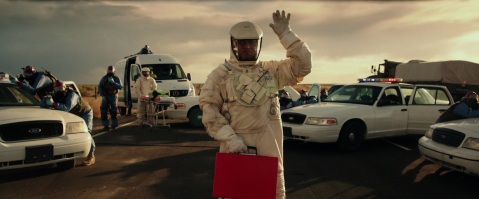
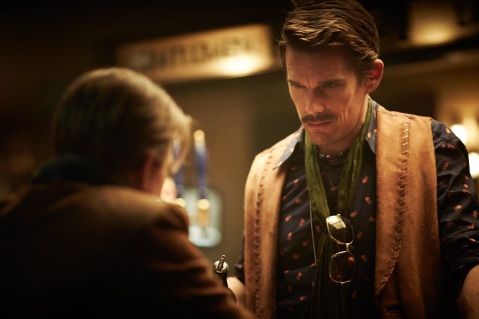
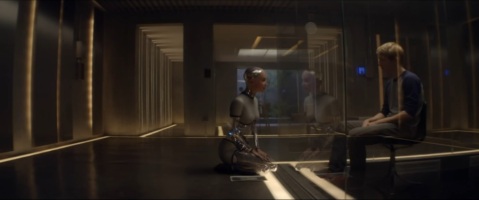
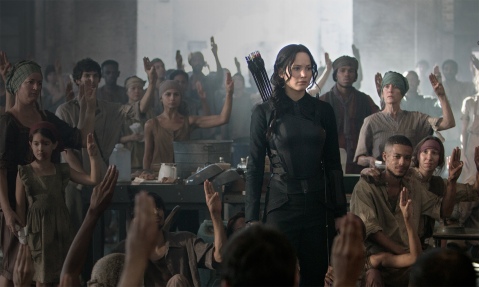
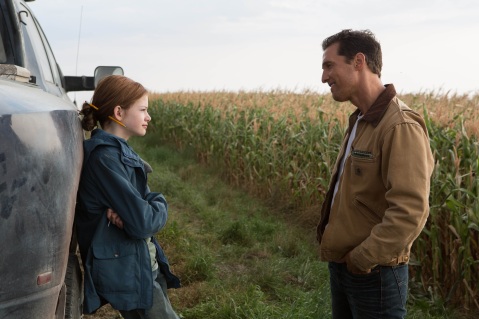
Recent Comments